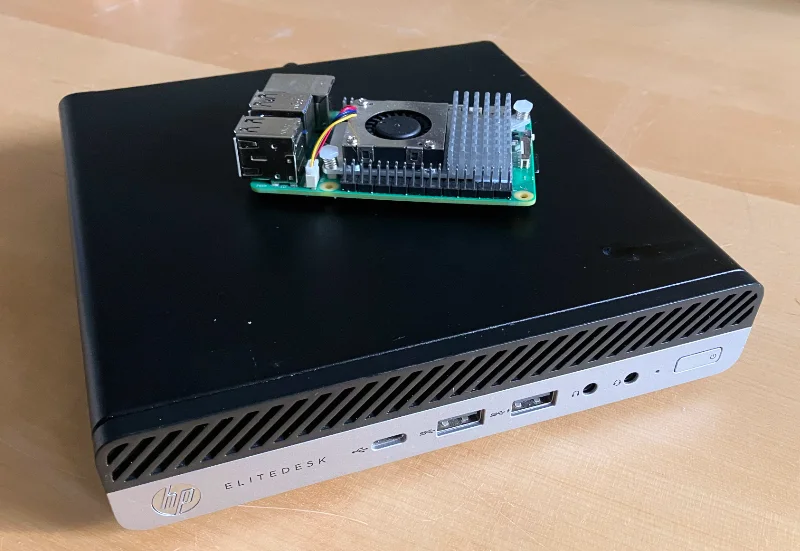The HP Elitedesk G4 705 is one of the systems part of the tinyminimicro home lab 'revolution' started by servethehome.com.
This revolution consists of Lenovo (tiny), HP (mini) and Dell (micro) computers and is based on the realisation that these computers are often a much better value-for-money than a Raspberry Pi.
Click on the image for detailed specifications
This particular computer, the Elitedesk G4 705 has an AMD Ryzen 3 PRO 2200GE quad-core processor, with a single-core performance three times that of a Raspberry Pi 5.
I got my unit with 16 GB of RAM for €115 ($124) including taxes and shipping. The Raspberry Pi 5 with 8 GB of RAM costs 91 Euro, almost exactly the same price as this computer without the 8 GB RAM upgrade. Yet, with the Pi, you still need:
- A power supply (€13)
- A case (€11)
- An SD card or other storage solution (€10-€25)
Meanwhile my particular Elitedesk came with a Samsung-based 256GB NVME drive that's €40+ euro new and comparing it with an SD card doesn't make any sense1.
The Intel Core i5-6500T is a populair processor for these mini PCs but the AMD Ryzen PRO 3 2200GE is just a tad slower regarding single-core performance. Comparing options, The Intel-based minis with similar storage capacity would have been 40% more expensive at around €160.
These mini PCs have CPUs tha
The Caveat
The CPU fan is noisy
The particular unit I got has a fan that is audible at idle. I'm unlucky as the fan noise resonates with the top half of the case, which can only be alleviated by putting something on top of the case.
I'm very sensitive to fan noise and I would never tollerate this machine on my desk next to me.
Under heavy load, the fan is very, very loud.
However, when you do work within a home lab, it's often not about sustained CPU usage. It's more about executing some commands of workflows that result in brief bursts of CPU usage and the fan won't spin up that much.
For me, this computer was a test purchase, as part of a plan to build a small four-node cluster setup for experimentation. I'm not so sure I'm going this route, just because of the fan noise.
People are different so if you aren't bothered that much by (fan) noise, more power to you, this (type of) computer could be a good option.
Power consumption (and why I hate Linux)
The unit came with Windows 11 pre-installed and I measured around 10-12 Watts idle power consumption.
After installing Debian 12 the system did 18 Watts at idle and so began a journey of many hours trying to solve this problem.
The culprit is the integrated Radeon Vega GPU. To solve the problem you have to:
- Configure the 'bios' to only use UEFI
- Reinstall Debian 12
- install the appropriate firmware with
apt install firmware-amd-graphics
If you boot the computer using legacy 'bios' mode, the AMD Radeon firmware won't load no matter what you try. You can see this by issuing the commands:
rmmod amdgpu
modprobe amdgpu
You may notice errors on the physical console or in the logs that the GPU driver isn't loaded because it's missing firmware (a lie).
This whole process got me to around 12 Watt at idle. To get to ~10 Watts idle you need to do two things:
- run
powertop --auto-tune(saves 1 Watt) - Unplug the monitor (run headless) (saves 1 Watt)
You have to put the powertop --auto-tune command in /etc/rc.local:
#!/usr/bin/env bash
powertop --auto-tune
exit 0
Don't forget to apply chmod +x /etc/rc.local
Given the whole picture, 10-11 Watt at idle is perfectly okay. A Raspberry Pi 4 or 5 does around 3-4 Watts at idle so it feels proportional.
KVM Virtualisation
I've run barebones KVM (Debian 12) on the Elitedesk G4 and it works totally fine.
Evaluation and conclusion
If the CPU fan noise is something you can deal with, this machine is an amazing homelab machine at a great value point. If you don't need GPIO pins for tinkering with hardware projects, just a good home server, this Mini PC seems to be a perfect option.
-
I measured multi-GB/s sequential read/write and 100MB+ random 4k read/write. ↩



Comments